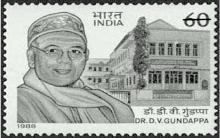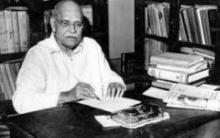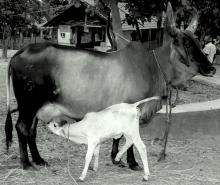ಈ ಎಲ್ಲ ಹಿನ್ನೆಲೆಯ ಕಾರಣ ಕೃಷ್ಣಮೂರ್ತಿಗಳು ಚಿಕ್ಕ ವಯಸ್ಸಿಗೇ ಕಾವ್ಯರಚನೆಗೆ ತೊಡಗಿದ್ದು ಸಹಜವಾದ ಬೆಳೆವಣಿಗೆ. “ದಾನಯಜ್ಞಮು” ಎಂಬ ಖಂಡಕಾವ್ಯವನ್ನೂ “ಶ್ರೀವಿಲಾಸಮು” ಎಂಬ ಶತಕವನ್ನೂ “ತ್ಯಾಗಶಿಲ್ಪಮು” ಎಂಬ ಮತ್ತೊಂದು ಖಂಡಕಾವ್ಯವನ್ನೂ ಅವರು ತೆಲುಗಿನಲ್ಲಿ ರಚಿಸಿದ್ದಾರೆ. ತಮ್ಮ ಸಂತೋಷಕ್ಕೆಂದೇ ಬರೆದುಕೊಂಡ ಕಾರಣ ಅನೇಕವರ್ಷಗಳ ಕಾಲ ಇವು ಪ್ರಕಟವಾಗಿರಲಿಲ್ಲ. ದಾನಯಜ್ಞವು ಮಹಾಭಾರತದ ಆಶ್ವಮೇಧಿಕಪರ್ವದಲ್ಲಿ ಬರುವ ನಕುಲೋಪಾಖ್ಯಾನವನ್ನು ಆಧರಿಸಿದೆ. ಶ್ರೀವಿಲಾಸವು ತನ್ನ ಹೆಸರಿನಿಂದಲೇ ತಿಳಿಯುವಂತೆ ಲಕ್ಷ್ಮಿಯ ಸ್ತುತಿ. ಇದು ಲಕ್ಷ್ಮಿಯನ್ನು ಕೇವಲ ಹಣಕಾಸುಗಳ ಮಟ್ಟಕ್ಕೆ ಸೀಮಿತಗೊಳಿಸದೆ ಸಾಧನ, ಸಂಪತ್ತಿ ಮತ್ತು ಸದ್ಗುಣಗಳ ಮಟ್ಟದಲ್ಲಿ ಸಾಕ್ಷಾತ್ಕರಿಸಿಕೊಳ್ಳುವ ಪ್ರಯತ್ನ. ಇಲ್ಲಿಯ ಒಂದೆರಡು ಪದ್ಯಗಳನ್ನು ಗಮನಿಸಬಹುದು:
Author:shashikiran
Right from my childhood, I was keenly interested in industrial ventures. During the days I was in the high school, procuring a job was naturally a common concern of students. Matriculation was a momentous landing after the first few flights of the staircase of education. There, one would pause to ponder over the future course. “What would you like to become - teacher, lawyer, doctors, engineer or officer?” - were the questions posed by the elders. I too was anxious about the future. This was when I was studying in the fourth Form in Mysore.
The Story of Guṇāḍhya in the Nepāla-māhātmya
ಇನ್ನೊಮ್ಮೆ ನಿಮ್ಹಾನ್ಸ್ ಸಂಸ್ಥೆಯವರು ಅವಧಾನಕಾಲದ ಮನೋವ್ಯಾಪಾರಗಳನ್ನು ತಿಳಿಯಲೆಂದು ರಾಜ್ಯೋತ್ಸವದ ಅಂಗವಾಗಿ ನನ್ನ ಅವಧಾನವನ್ನು ಆಯೋಜಿಸಿದ್ದರು. ಇದಕ್ಕೂ ಕೃಷ್ಣಮೂರ್ತಿಗಳೇ ಸೂತ್ರಧಾರರು. ನಿಮ್ಹಾನ್ಸ್ ಸಂಸ್ಥೆಯ ರೋಗಿಗಳನ್ನು ಕರೆದೊಯ್ಯುವ ದೊಡ್ಡ ಬಿಳಿಯ ವ್ಯಾನಿನಲ್ಲಿ ಪೃಚ್ಛಕರೊಡನೆ ಅಲ್ಲಿಗೆ ಹೊತ್ತಿಗೆ ಮುನ್ನವೇ ತಲುಪಿದ್ದಾಯಿತು. ವೇದಿಕೆಯ ಮುಂದೆ ಸಾಕಷ್ಟು ಜನರಿದ್ದರೂ ಒಬ್ಬರ ಮುಖದಲ್ಲಿ ಕೂಡ ಸ್ಪಂದನವಿರಲಿಲ್ಲ. ಇಂಥವರಿಗೆ ಹೇಗೆ ತಾನೆ ಅವಧಾನದಂಥ ಅಭಿಜಾತಕಲೆಯನ್ನು ಮುಟ್ಟಿಸುವುದೆಂಬ ಚಿಂತೆ ನನಗಾದರೆ, ಲಂಕಾ ಕೃಷ್ಣಮೂರ್ತಿಯವರು ನಿಶ್ಚಿಂತರಾಗಿ ಹೇಳಿದರು: “ಸಾರ್, ಇದು ಅವರ ಅಧ್ಯಯನಕ್ಕೆ ವಸ್ತು. ನಾವು ಅದಕ್ಕೆ ಬೇಕಾದ ಅನುಕೂಲ ಮಾಡಿಕೊಡೋಣ.
ಅವಧಾನ ಮರುದಿನ ಸಂಜೆ ಏರ್ಪಾಟಾಗಿತ್ತು. ಹೀಗಾಗಿ ಹಿಂದಿನ ದಿನವೆಲ್ಲ ನಮಗೆ ಬಿಡುವಿತ್ತು. ಹತ್ತಿರದ ಕೆಳದಿ, ಇಕ್ಕೇರಿ, ಬನವಾಸಿ ಮುಂತಾದ ಕ್ಷೇತ್ರಗಳಿಗೆಲ್ಲ ಶರ್ಮರು ನಮ್ಮನ್ನು ಕರೆದೊಯ್ದರು. ಎಲ್ಲೆಲ್ಲೂ ಸುಗ್ರಾಸವಾದ ಹವ್ಯಕಭೋಜನ ಸ್ವಾಗತಿಸುತ್ತಿತ್ತು. ರಾತ್ರಿ ಹೊಸಬಾಳೆಯಲ್ಲಿ ಗಮಕಿ ಸೀತಾರಾಮರಾಯರ ಮನೆಯಲ್ಲಿ ಉಳಿದದ್ದಾಯಿತು. ಅವರು ಶರ್ಮರ ಬಂಧುಗಳೂ ಹೌದು. ಜಗಲಿಯ ಮೇಲೆ ಪದ್ಮನಾಭನ್ ಅವರು ಮಲಗಿದರು. ಅವರ ಇರ್ಕೆಲಗಳಲ್ಲಿ ಕೃಷ್ಣಮೂರ್ತಿಗಳಿಗೂ ರಂಗನಾಥಶರ್ಮರಿಗೂ ಹಾಸಿಗೆ ಹಾಸಿತ್ತು. ನಾನು ಈ ಹಿರಿಯರಿಂದ ಸಾಕಷ್ಟು ದೂರದಲ್ಲಿ ಮಲಗಿದ್ದೆ. ದಿನವಿಡೀ ಸುತ್ತಿದ್ದ ಕಾರಣ ಎಲ್ಲರಿಗೂ ದಣಿವು. ಯಾವಾಗ ನಿದ್ರೆಗೆ ಜಾರಿದೆವೋ ಒಬ್ಬರಿಗೂ ನೆನಪಿಲ್ಲ. ಮುಂಜಾನೆ ಎದ್ದು ಪದ್ಮನಾಭನ್ ಅವರನ್ನು ಮಾತನಾಡಿಸಿದೆ.
A distant relative of mine, who was quite well-to-do and had heard about my academic prowess agreed to provide me with some financial assistance. He, in fact, had seen a potential groom in me. This (his assistance) went on for five to six months. I joined the Fourth Form at the High School in the Maharaja college in Mysuru.










